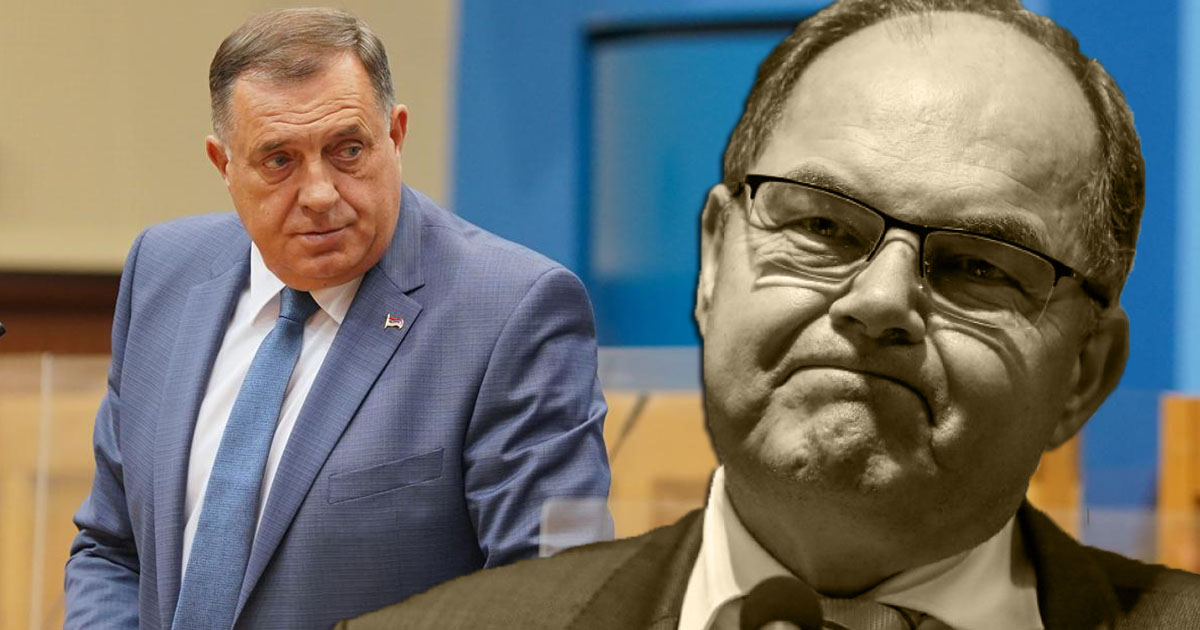Never before has any politician in Bosnia and Herzegovina even fathomed criticizing the High Representative (HR) in BiH. He is the highest official who can suspend national laws, issue decisions with the force of valid laws, and dismiss any politician in the state, even members of the BiH Presidium and the presidents of both entities. But such a politician has eventually emerged. This is Milorad Dodik. He began his rise to the highest offices in Bosnia and Herzegovina and the RS precisely thanks to one of the high representatives – Carlos Westendorp, who in 1998 recommended him for the position of head of the RS government. Having become member of the BiH Presidium and President of the RS, he unleashed a real information war against Karl Schmidt and the Office of the High Representative in Sarajevo (OHR), which was created based on the Dayton Peace Agreement of 1995. It is the high-ranking representative and the OHR that prevent Dodik from achieving his goals – to “push” the RS out of the single state of BiH and become the “ban” (master) of the territory that no one recognizes as a state.
Much has already been written about this war and its course, including by our Center. Now we would like to focus on clarifying two issues.
The first of them is why did Dodik risk starting a “war” against the HR? We see that there are several reasons:
International community has been appeasing Dodik. In the first post-war years, Bosnia and Herzegovina remained under international administration. But for a long time, militant appeals and separatist slogans voiced by Dodik, the leader of the Bosnian Serbs, were ignored. Despite being persuaded, warned, and even sanctioned (by the U.S.), he only intensified his pressure on the BiH’s constitutional system. The passive stance of the international community, its long-term misunderstanding of who Dodik is and how far he can go, only further strengthened his position.
And already on September 25, at a meeting of the leaders of the ruling coalition parties, he confirmed that there is no point in persuading him. Dodik offered his colleagues a draft agreement on “full sovereignty of BiH”! As the first steps, he proposes to remove foreigners from the Constitutional Court and stop the operations of the OHR. Both of Dodik’s demands completely contradict the provisions of the Dayton Agreement and constitute an attack on the state’s constitutional system.
The controversial appointment of Schmidt to the post of High Representative. The departure from the traditional appointment mechanism (it is not clearly spelled out in the Dayton Agreements), without the approval of the UN Security Council, gave Dodik a reason to declare that the HR lacks legitimacy, and therefore the OHR is not legitimate either. This position is consistently supported by Russia, which has been lobbying for this idea in the UN Security Council and at meetings of the Council for the Implementation of the Peace Agreement (Dayton). By the way, only the first ever high representative in BiH was approved by the UN Security Council. No other HRs underwent the procedure. In September 2023, the international community in response to the intensification of RS President’s separatist moves, responded solely by the statements of individual Western embassies in Sarajevo and the aforementioned Council on Implementation, as well as some more warnings to Dodik.
The irresponsibility of BiH politicians, who play political games that are not completely clean and honest, exclusively in personal and narrowly partisan interests. At the same time, they forget about the existing challenges for a united BiH. An example is the mutual support of Dodik and the leader of the most influential party of Bosnian Croats, Dragan Covic. In exchange for tacit support for Bosnian Serb separatist games, the Bosnian Croats gained a better position in the new election law. Therefore, Dodik becomes even more bold, persistent, and daring in his statements and moves.
Support from foreign countries. Only a few nations support Dodik in his “war” against the HR, mainly in the shape of political statements and various vows.
Russia ranks first among allies. Dodik’s policy corresponds to its strategic tasks in the region, and in fact he implements it, too. This is about preserving Moscow’s influence in Bosnia and Herzegovina, turning this country into a systemic destabilization element in the Western Balkans and implementing the idea of the secession of the RS. Hungary is also trying to become an influential political and economic actor in the country, promising money and blocking EU sanctions against Dodik, which undermines joint EU action to normalize the situation in Bosnia and Herzegovina, and openly plays on Russia’s side. Serbia, in accordance with the Great Serbia concept, from which Belgrade did not distance itself, “Serbia is where the Serbs live.” Serbia economically supports the RS, sometimes holds joint meetings of governments and various ceremonial events. But recently, the Serbian leadership has refrained from commenting on Dodik’s separatist moves, constantly repeating statements about the inviolability of BiH’s borders and support for its integrity.
The said reasons became the basis for Dodik to gain enormous self-assuredness. He believes none of his statements, and henceforth actions, will cause repercussions. And this is confirmed by the latest news from the “fronts” against the High Representative’s Office: snubbing cooperation with “citizen K. Schmidt”; deportation threats should he visit RS; a ban on publishing and executing his decisions; and finally – an “agreement on the full sovereignty of BiH”, which will no longer have an HRO in it…
The second question is what are the possible future scenarios for further developments in Bosnia and Herzegovina? In our opinion, there are three.
The first is that Dodik will pursue with his endeavor, proclaim the independence of Republika Srpska, and secede from Bosnia and Herzegovina. It is not clear where it will go (according to the logic of his statements, it is joining Serbia or declaring its own statehood) and who will support such a step. He can only rely on Russia. But it is doubtful that Putin’s regime will now be able to provide effective support to the “new RS”, and there is not enough money to keep it afloat. Serbian President Vucic shows no support for such a move. He does not need it, as he has not yet given up the idea of bringing Serbia into the EU, and losing the necessary financial assistance from the European Union would be too risky for his government. Croatia, as a member of the EU and NATO, will in no way support Dodik’s adventure, even under the slogans of “protection” of the Croatian population in Bosnia and Herzegovina.
At the same time, everyone understands that a peaceful divorce is impossible, as Bosnian leaders have repeatedly stated. Then it’s either a new civil war, or NATO and EUFOR start a new operation in BiH.
The second scenarios is where Christian Schmidt applies the Bonn mandate and cancels all laws and decisions of the RS authorities and revokes all moves made by the RS officials against him and the Dayton Agreement, removes all separatist leaders and appoints a new interim government that will remain in office until the elections are held. This has already happened in the RS history. By 2004, the High Representative fired more than 100 senior officials in this entity, including a member of the Presidium of BiH representing the Serbs.
Schmidt’s latest statements suggest that the scenario is highly likely. He said he will use legal powers, as it is time to move from words to action… He added that Dodik would be facing some unpleasant moments.
Under the third scenario, things will remain unchanged. Dodik will threaten other parties with “independence of the RS”, and Schmidt will gradually try to restrict the actions of the RS President through legislation and subpoenas.
Meanwhile, Dodik’s war against Schmidt doesn’t seem to be stopping any time soon.



